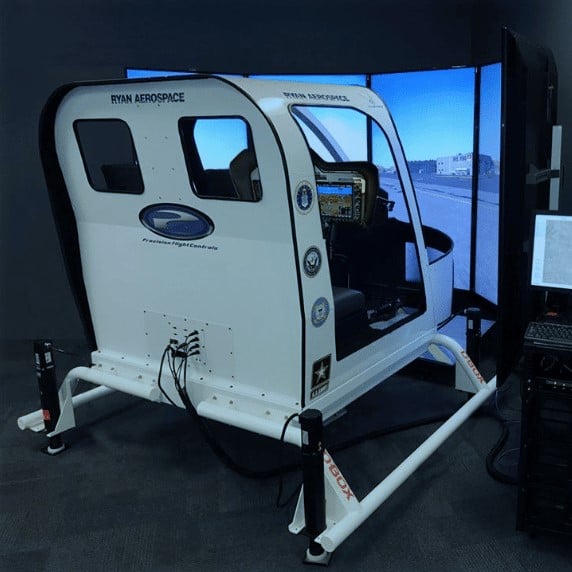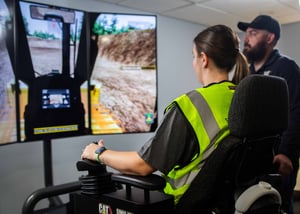D-BOX Technologies, Ryan Aerospace, Precision Flight Control and Quantum3D combine expertise and technologies to fly the Bell 206 helicopter simulator into uncharted territory.

CONTEXT: LOTS OF INDUSTRY COMPETITION
With so many companies competing for everyone’s attention at I/ITSEC 2016, standing out from the crowd is a challenge that most exhibitors have a hard time with. Of course, flashy display booths, colorful visuals and slick pamphlets are all fine, but to truly separate yourself from the herd, you need something unexpected and different. D-BOX Technologies, Ryan Aerospace, Precision Flight Controls and Quantum3D may have raised the bar this year.
After years of making their mark on the industry, these highly innovative companies have teamed up to build a new Bell 206 helicopter pilot trainer that is built into a very realistic frame.
This versatile and easy-to-adapt prototype combines D-BOX’s state-of-the-art motion-cueing technology with visual realism from Quantum3D, a California-based developer and manufacturer of real-time visual simulation systems. They made their Independence® IDX 80 Image Generator available for this advanced avionic training device by connecting via CIGI (Common Image Generator Interface) to tremendously augment the visualization quality. The result is a visual immersion that is extremely realistic.
CHALLENGE: MAKE THE SIMULATOR STAND OUT
For D-BOX, the objective was clear from the start: to bring the simulator to life by meticulously replicating all the appropriate motion cues specific to the Bell 206 in order recreate real-life flight sensations for the pilot and co-pilot. In addition to being a two-seater prototype, it needed to stand out as it would be the first simulator that utilizes the skills, experience and talent from three innovative companies to bring state of the art immersion solutions to the industry.
With versatile software and ease of deployment, the prototype would be used to train pilots in the medic, army and evacuation services.
SOLUTION: WORK WITH PARTNERS TO CREATE A CUSTOM & DETAILED SIMULATOR
All four companies worked together to create the best experience for trainees of the Bell 206 helicopter.
“A quality training experience always depends on maximizing the level of realism and immersion within the simulator, regardless of the price-point,” explained Jan Bjernfalk, VP of products at Quantum3D.
“We’re impressed with the experience provided by the D-BOX motion cueing system in such a small form factor and attraction price. D-BOX enables the use of realistic motion in low-cost applications previously unimaginable, and it’s why we felt it’s a perfect match for our award-winning and highly scalable MANTIS® image generation software.”
– Jan Bjernfalk, VP of products at Quantum3D
“D-BOX enables the use of realistic motion in cost-sensitive applications previously unimaginable, and it’s why we feel it’s a perfect match for our flight training devices,” added Mike Altman, CEO & President of Precision Flight Controls.
Together, the four companies came together to build a Bell 206 helicopter simulator.
RESULTS: MORE COMPACT, RELIABLE & ACCESSIBLE TRAINING
Given the overall growing budget deficits in the industry and market needs for improved systems, the fact that the Bell 206 simulator utilizes COTS Solutions from the training and simulation industry definitely gives it added value.
“Working with Quantum3D and Precision Flight Controls was a satisfying experience for us on so many levels and only demonstrated the potential of what can be achieved when you bring together some of the best minds and technologies in the industry,” said Yannick Gemme, the Vice President of Sales at D-BOX. “The high reliability and low risk of our COTS motion-cueing system translates into less downtime and better performance characteristics. Plus, it integrates seamlessly with the world’s best simulation applications, which ultimately results in substantial cost savings.”
“The D-BOX design allows our simulators to take up much less room than our competitors, and space is always a consideration when purchasing a motion-based simulator.”
– Mike Altman, CEO & President of Precision Flight Controls.
“These simulators are filling a need within the market and are solving some of the main challenges the flight training industry is facing. For the most part, training platforms are far from stimulating for pilots. By combining optimum hardware with the best visuals and the finest motion cueing into one integrated solution, we have created a highly immersive, exciting solution that is very accessible, extremely effective and easy to adopt by trainees.”

